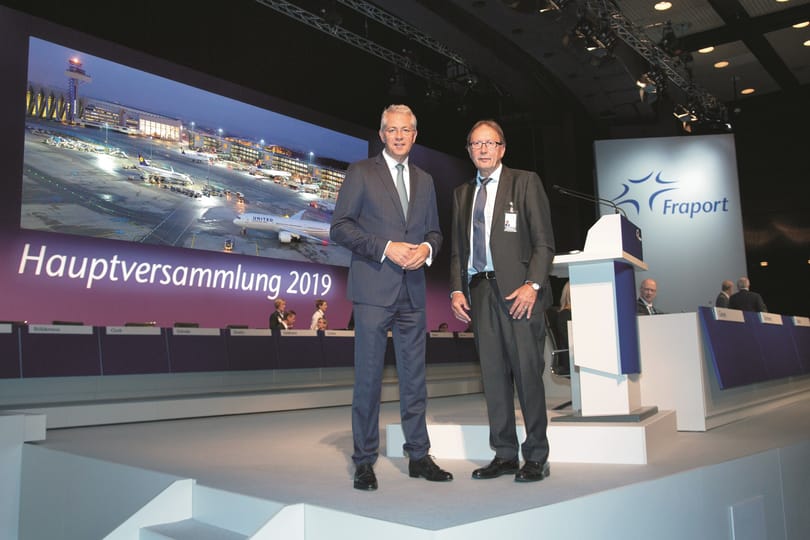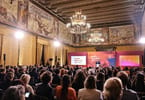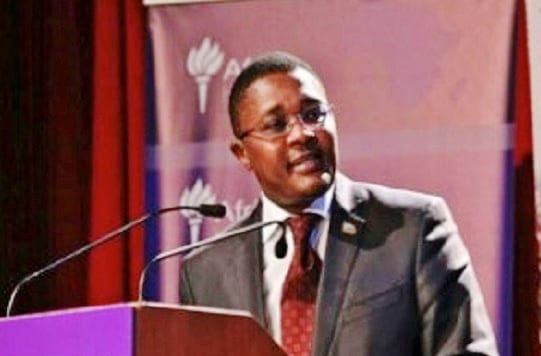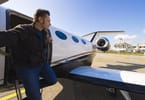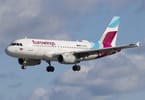haut, Fraport AG published in advance the speech to be presented by executive board chairman (CEO) Dr. Stefan Schulte at the company’s upcoming Annual General Meeting 2020. This gives shareholders the opportunity to review the speech before submitting their questions on the agenda topics. Questions have to be submitted online by May 23 (until 24:00). Due to the COVID-19 pandemic, Fraport’s AGM will be held for the first time in a virtual-only format on May 26, 2020, at 10:00 a.m. (CEST).
I. Current Situation: Effects of the COVID-19 Pandemic
Dear shareholders, ladies and gentlemen,
I also warmly welcome you to Fraport AG’s Annual General Meeting, which this year
is virtual-only for the first time ever. I would have liked to have personally welcomed
you to the Frankfurt Jahrhunderthalle, as in previous years. Unfortunately, this is still
not possible in these times.
Therefore, we are all the more pleased that the lawmakers made it possible for
Annual General Meetings to be held in this way, and that we were not forced to
postpone the event. Because especially in this severe crisis, in which the entire
aviation sector is stuck, it is important that we report and account to you on the
situation of your company, on the measures the company executives have taken, and
how we see the future development. On the flip side, it is equally important for you to
be able to exercise your rights as shareholders. For you to ask questions, submit
requests, and vote on the agenda items.
We are broadcasting the Annual General Meeting today from a conference room at
our corporate headquarters. To adhere to the current recommendations, we have
kept the physical attendance of the Executive Board and Supervisory Board to a
minimum. My colleagues on the Executive Board – Anke Giesen, Michael Müller, Dr.
Pierre Dominique Prümm, and Dr. Matthias Zieschang – will follow the Annual
General Meeting online just as the remaining members of the Supervisory Board.
Dear shareholders, a year ago at the Annual General Meeting, our discussions
focused on how we would even be able to cope with the strong growth in Frankfurt.
How the industry overall could increase punctuality and reliability, despite high
utilization rates at the time. Today, planes are parked on Frankfurt’s Runway
Northwest and the terminals are empty. No one could have imagined such images
only three months ago.
We are in the midst of the severest crisis in modern aviation. The current situation
makes even a massive slump, such as after the financial crisis, seem comparatively
harmless. Before I talk about the 2019 fiscal year, I would like to give you an
overview of the current situation.
During the course of the COVID-19 pandemic, travel restrictions have increased
significantly worldwide since the beginning of March. As a result, airlines have
repeatedly scaled back their flight schedules. For example, Lufthansa cut long-haul
capacity by 50 percent since mid-March compared to its original planning, and then
reduced flights down to 10 percent by the end of March. With its significantly reduced
schedule, Lufthansa is ensuring at least a certain minimum level of flight connections,
just like other airlines at Frankfurt Airport.
However, this number of flights is extremely low compared to normal times: in April,
passenger numbers were about 97 percent lower compared to the same month last
year. In total, we served about 188,000 passengers in the entire month. That’s less
than the passenger traffic we had on an average single day last year.
At least, and this is positive news during this difficult time, air cargo continues to run
at a high capacity. The decline in volume of around 20 percent in April compared to
the same month last year is mainly due to the lack of cargo capacities on passenger
flights. Currently, there are significantly more cargo-only flights than usual. In some
cases, airlines have even converted passenger aircraft for cargo transport. I would
like to pay particular tribute to our employees in ground handling, some of whom are
unloading and loading cargo out of the aircraft by hand. That’s hard, physical work.
We are proud Frankfurt Airport, as a central cargo hub, ensures the supply of the
people in Germany with important goods. These include protective masks, medicine,
and medical equipment, but also important components for industrial production. The
airport’s great importance for the region – and Germany as a whole – is also a vital
reason for us to keep the airport open, even if it is not worthwhile from a financial
point of view. This is because normally the revenue share of the cargo business for
us as an airport operator in Frankfurt is only one percent.
Let’s look at the situation at our international airport locations. There, too, air traffic
has largely come to a standstill. For the most part, there are severe travel restrictions.
And in some cases, operations at the airports have been temporarily suspended
completely at the order of local governments. As a result, depending on the airport
passenger figures decreased by 92.1 to 99.9 percent in April, compared to same
month last year. Only Xi’an Airport in China posted noticeable traffic with around 1.4
million passengers, representing a decline of 64.1 percent.
We responded to this drop in traffic at an early stage and took comprehensive
measures to reduce costs. This applies both to our global airports and to our
Frankfurt home airport. Since the end of March, over 18,000 of our more than 20,000
employees in Frankfurt have been working in short-time shifts. On average, working
hours across the entire workforce at the Frankfurt location have been reduced by
about 60 percent, and up to 100 percent in individual areas. Although we have
voluntarily increased the statutory short-time working allowance, we are aware that
this loss of income hits many of our employees hard. But this measure is necessary
to keep our company viable in this crisis and to maintain as many jobs as possible.
In addition to personnel costs, we have also eliminated all operationally non-essential
non-staff costs as much as possible. We have reduced or delayed planned capital
expenditures at the existing terminals and on ramp areas. And, of course, we have
adjusted the utilization of our infrastructure to reduce operating costs.
On the airside, we temporarily shut down two of our four runways. You have already
seen the photo of parked planes on Runway Northwest. We also temporarily closed
Runway South, due to urgent refurbishing works. We brought this project forward,
because we were able to implement it faster and a bit cheaper during this period of
low traffic. In the meantime, renovations have been completed and Runway South is
back in operation. In addition to Runway Northwest, Runway West is also currently
net benotzt ginn.
We have also temporarily closed down large parts of the passenger terminals in
order to reduce operating costs. Since the beginning of April, Terminal 2 has not
been used for passengers. The remaining flights are only handled in Terminals 1A
an B.
You can see from these examples that we are at a stage in which we are taking a
very critical look at all costs and pending capital expenditure. Nevertheless, we are
committed to building Terminal 3. There are two key reasons for this. First, we are
convinced that we will again see long-term growth in air traffic. A new terminal is not
built on an outlook of just two or three years, but rather for the decades to come.
Secondly, from a technical and economic point of view it would be grossly negligent
to temporarily put such a large-scale project on hold, and ramp it up again later. This
would cause enormous additional costs and lead to massive technical and structural
risks. This is why we are continuing construction. The special civil engineering was
completed last year, and the structural engineering and the technical installations are
currently being carried out. In addition, this year we started to build the car park and
the connection to the passenger transport system. However, we are also noticing at
the moment that, due to the coronavirus crisis, the availability of material and
personnel, in particular, on the part of service providers and subcontractors is limited
at times. This leads to delays of individual construction measures, which we have to
akzeptéieren.
But we are preparing your company and Frankfurt Airport for a successful future not
only with the construction of Terminal 3. There has been a lot happening at our
existing terminals in recent weeks, as well. We have used the time to make our
airport ready for restarting operations under new, significantly stricter hygiene
conditions. There is no question that the health and safety of our passengers and
employees is always our top priority. This is in our DNA at Fraport, as well as the
entire aviation industry.
In Terminal 1, we have already implemented numerous measures: floor markings
and adapted passenger guidance in waiting areas, plexiglas dividers as protection at
the counters, stands with disinfectants, signs and regular announcements regarding
rules of behavior. In addition, trained staff are available to alert travelers if rules are
not being followed. The use of check-in counters, security checkpoints, baggage
belts, and passenger buses has been adapted and organized in such a way as to
prevent larger groups gathering and to ensure adherence to the distancing rules.
Employees who, due to their activities, are unable to comply with the applicable
distancing regulations, such as at the security checkpoints, wear face masks.
Passengers are currently required to wear protective masks in passenger buses and
in shops at the airport. We currently assume that the responsible authorities will
declare it mandatory for all passengers, guests, and employees to wear a mask when
entering the terminal.
The airlines have also taken comprehensive measures during flights. The bottom line
is that, and I say this with complete conviction, the aircraft is also and especially
during this pandemic, a very safe means of transportation. We hope that we will soon
see an easing of measures in air traffic as well and that travel restrictions will be
gradually reduced. After all, a well-functioning aviation sector is crucial to revitalize
economic life and limit the negative consequences for the global economy.
II. Review of the 2019 Fiscal Year and the Current Financial Situation
Following this overview of the current situation, we now come to the financial
situation of your company. Let’s start by taking a look at the past fiscal year. The key
figures show that 2019 was a successful year. The bottom line is that we achieved all
of our financial goals. This is a strong performance, which we owe above all to our
more than 22,000 employees. On behalf of the entire Executive Board I would like to
thank our employees for their commitment and efforts.
Passenger numbers increased both in Frankfurt as well as at most of the
international Group airports. Accordingly, Group revenue rose by 4.5 percent to just
under 3.3 billion euros. This amount is adjusted for the contract revenues relating to
capacitive capital expenditure, based on the application of IFRIC 12, totaling 446.3
million euros.
Operating earnings before interest, taxes, depreciation and amortization, EBITDA,
rose by 4.5 percent to just under 1.2 billion euros. Overall, the Group result fell by
10.2 percent to 454.3 million euros. However, this was mainly due to a one-off effect:
in 2018, the disposal of the shares in Flughafen Hannover-Langenhagen GmbH
contributed around 75.9 million euros to the Group result. Adjusted for this one-off
effect, the Group result would have also increased last year.
Fraport’s international investments, which have continually made an increasing
contribution to revenue and results in recent years, once again made a significant
contribution to this strong development.
An important key figure, that we are exceptionally pleased to see decline, is the CO2
emissions of your company, Fraport AG. Last year, we reduced emissions by almost
10 percent at the Frankfurt location. So we are completely on track. Despite the
current crisis, we are of course sticking to our climate protection goals! By 2030, we
will substantially reduce our CO2 emissions here at Frankfurt Airport to 80,000 metric
tons. By 2050, we want to be CO2 free, meaning no CO2 emissions at all. In order to
achieve this goal, we must continue to act now.
In addition to other measures, we plan to conclude a power purchase agreement with
an offshore wind farm. Such an agreement on a future purchase volume paves the
way for us to meet our electricity demand at the Frankfurt location with renewable
energies. In addition, one of the first large-scale photovoltaic systems is currently
being built at Frankfurt Airport on a new cargo hall in CargoCity South.
This is our review of 2019, which was consistently positive. The results of the first
quarter of 2020 underscore how important it is that we have performed successfully
in recent years and created a solid basis for the future. Although passenger traffic in
January and February was still relatively normal despite the initial declines in traffic to
Asia and only came to a real slump in March, our Group result was negative in the
first quarter – for the first time since our IPO in 2001. The negative result amounted
to minus 35.7 million euros, compared to a positive Group result of 28.0 million euros
in the same quarter of the previous year.
Dear shareholders, we would like to present the current economic and financial
situation of your company as transparently as possible. Despite massive measures to
reduce costs, we currently – that is, as long as we operate our Group airports without
significant passenger traffic – have a negative free cash flow of around 155 million
euros per month. This amount is broken down with approximately 110 million euros
for the Frankfurt location and approximately 45 million euros for our international
airports. Of course, this is only a rough estimate that depends on many factors. The
savings already achieved in operating costs of around 30 percent and a reduction in
capital expenditure of around 25 million euros per month have already been taken
into account here.
Despite these massive cash outflows, your company has sufficient liquidity to survive
the current situation for many months to come. By conducting comprehensive
financing measures, we were able to increase liquidity reserves even during the
crisis. In total, we borrowed around 1.2 billion euros in additional loans in the first four
months of the year. As of April 30, 2020, we had around 2.4 billion euros in cash and
cash equivalents, as well as committed credit lines. This is an increase of around 700
million euros compared to 1.7 billion euros as of December 31, 2019 – despite the
free cash flow that was already negative in the first four months. This shows that we
are able to finance our business under favorable market terms even during these
difficult times. We will continue to make use of financing activities in the coming
weeks and months to set up your company in a crisis-proof position for the long term.
To further ensure the financial stability of your company, in an extraordinary meeting
at the end of March 2020 the Executive Board decided to propose to the Supervisory
Board and to you, the Annual General Meeting, to forgo the dividend payment for the
2019 fiscal year. Instead, the proposal is to allocate it to the revenue reserves in
accordance with Agenda Item 2, and thus strengthen the base of shareholders’
Eegekapital.
Dear shareholders, this step was not easy for us. But, in our view, the decision was
necessary and sensible.
Looking at the share price development: all stock indices worldwide have
experienced massive slumps in the wake of the COVID-19 pandemic. And
companies in the aviation industry have been hit particularly hard. This is because we
were among the first companies to be affected by the crisis, and we will probably be
among the last to ramp up our business afterwards. This has been clearly seen in the
share price, which has accordingly slumped even more than the market-wide indices
such as the DAX30 or the MDAX.
III. Outlook
And this brings me to the question: what will happen next, and what are the
prospects for our company and for the aviation sector as a whole? Global travel
restrictions are still largely in effect, but public life is increasingly returning to normal.
And we can see the first glimmers of hope for the aviation industry, such as
announcements from various airlines about gradually expanding their flight
Zäitpläng.
Nevertheless, the uncertainties are still so high that we are not yet able to give a
specific forecast for the current fiscal year. It is clear that traffic figures in Frankfurt
will be well below the previous year’s level. As of today, it is very difficult to say how
far traffic will fall.
However, the development so far and the signals we are getting from the market
suggest that a decline in passenger traffic in Frankfurt in the order of 60 percent or
even more seems realistic. But these are only indications and not a reliable outlook.
Accordingly, we expect all financial performance indicators to show a significantly
negative development in the 2020 fiscal year. Based on this forecast, we expect
Group EBITDA and EBIT overall to decline sharply. Due to depreciation and
amortization and interest expenses, we expect the Group result to be clearly
negative. For the second quarter, it is already clear that the economic impact of the
coronavirus pandemic will affect us considerably harder than in the first quarter.
With regard to the dividend for the current year, we will also propose to the
Supervisory Board and the upcoming Annual General Meeting that no dividend be
paid. Anything else would be irresponsible, given the expected negative result.
Nevertheless, dividend continuity remains a very important goal for us in the future
and a cornerstone of our strategy.
The medium- and long-term outlook is also still very uncertain. However, some
structural developments that will shape the post-crisis period are already foreseeable.
We expect to see consolidation on the supply side. Not every airline will survive this
crisis. Many airlines that survive will have to reduce their capacities and thus their
flight offers. And they will bear a heavy debt burden. With fewer offers and less
competition, there are fears that ticket prices will tend to rise.
On the demand side, a distinction must be made between business customers and
passengers traveling for private reasons. In the business sector, demand will be
lower. To reduce spending, many companies will initially be more restrictive in their
approach to business travel by their employees. Some companies will also continue
to use the possibilities tested in the current exceptional situation, such as virtual
meetings, and flying less. Nevertheless, personal exchange remains important in a
global economy, and we will continue to see business travel on a relevant scale.
In the private sector, we are very confident that people want to continue flying. They
want to explore the world and get to know other countries. But perhaps not everyone
will want or be able to afford a trip at first. Above all, it is important whether and to
what extent unemployment rises and disposable income declines.
At the moment, we expect that even in 2022/2023 we will still be below the previous
high-levels for passenger traffic. At the moment, a decline of about 15 to 20 percent
compared to the 2019 figure of around 70.5 million passengers in Frankfurt seems
realistic to us. This is what we are preparing your company and Frankfurt Airport for.
This also means that we need to adapt existing resources and capacities beyond the
current measures.
All this is aimed at keeping your company viable in the future. This is in the interests
of our customers, our employees, and in your interests, dear shareholders. We are in
a good position to benefit from the restart of air traffic and the global trends that will
remain intact in the long term. It is also clear, however, that we will have to
reestablish your company Fraport for the future after coronavirus – in order to remain
competitive. In doing so, we rely on your support – stay with us.
Finally, I would like to take this opportunity to thank a man who through his dedicated
help and support over the past 16 years has shaped the destiny of your company
more than almost anyone else. Dear Mr. Weimar: You announced in February that
you would be stepping down from the Supervisory Board at the end of today’s Annual
General Meeting. On behalf of the entire Fraport team, I would like to thank you, Mr.
Weimar, for your unwavering commitment to Fraport AG. You have managed to
overcome even the most challenging obstacles and moments with your foresight,
your expertise, your well-balanced nature, and your perseverance. The success that
Fraport AG has enjoyed in recent years is in no small part down to you. You have
promoted and supported the international development of Fraport through
investments worldwide. And you have continuously developed our Frankfurt
homebase: by closely supervising and advancing the construction of new Pier A+,
Runway Northwest and Terminal 3.
Even though we would like to continue benefiting from your experience, especially
during this severe crisis: with 70 years of age, you have more than earned the right
to relax a bit and spend more time with your family. Dear Mr. Weimar, thank you for
16 fascinating, instructive and successful years together at Fraport AG!
Dear shareholders, thank you for your attention and stay healthy!
#rebuildingtravel
WAT VUN DESEN ARTIKEL WEI HUELEN:
- Due to the COVID-19 pandemic, Fraport's AGM will be held for the first time in a virtual-only format on May 26, 2020, at 10.
- Before I talk about the 2019 fiscal year, I would like to give you an.
- We are proud Frankfurt Airport, as a central cargo hub, ensures the supply of the.

